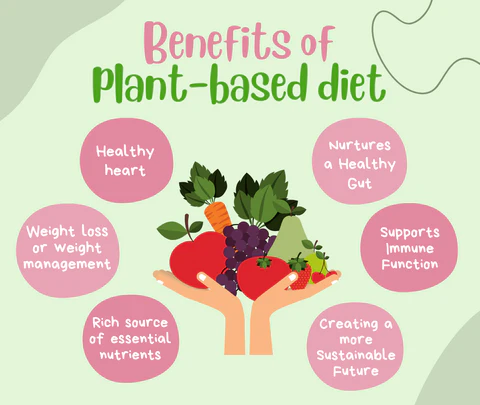In recent years, plant-based diets have gained significant traction across the United States, with more people than ever embracing veganism or reducing their consumption of animal products. What was once considered a niche lifestyle has now entered the mainstream, with plant-based options readily available in restaurants, grocery stores, and fast-food chains nationwide. But why are so many Americans making the switch to plant-based diets? Let’s explore the reasons behind this growing trend.
1. Health Benefits of a Plant-Based Diet
One of the most compelling reasons people turn to veganism is the potential health benefits. A plant-based diet, rich in fruits, vegetables, legumes, nuts, and whole grains, is linked to a reduced risk of chronic diseases such as heart disease, diabetes, and certain cancers. Numerous studies have shown that people who consume fewer animal products tend to have lower cholesterol levels, better blood pressure, and a healthier weight.

For many Americans, the growing awareness of the link between diet and health has fueled the decision to cut back on or eliminate animal products. The rise of documentaries and books highlighting the negative health impacts of meat-heavy diets has only strengthened this movement.
2. Environmental Concerns
The environmental impact of animal agriculture is another major factor driving the plant-based diet trend. According to research, raising livestock for food is a leading cause of deforestation, water usage, and greenhouse gas emissions. By switching to a plant-based diet, individuals can significantly reduce their carbon footprint.

More Americans are becoming conscious of how their food choices impact the environment. The idea that personal dietary changes can contribute to slowing climate change and conserving resources is motivating many to explore veganism as a sustainable alternative.
3. Animal Welfare
For a large portion of the vegan community, the decision to stop eating animal products stems from a desire to reduce animal suffering. Documentaries like Cowspiracy and Earthlings have shed light on the inhumane conditions in factory farming, pushing many people to adopt a cruelty-free lifestyle.
The growing awareness of animal welfare has led to increased advocacy for more humane treatment of farm animals, with veganism emerging as a solution for those who wish to live in alignment with their ethical values.
4. Increased Accessibility of Plant-Based Foods
The plant-based food market has exploded in recent years, with companies like Beyond Meat, Impossible Foods, and others creating plant-based alternatives that taste remarkably similar to their animal-based counterparts. These products have made it easier for the average consumer to try veganism without feeling like they are giving up their favorite foods.

Restaurants, grocery stores, and fast-food chains across the U.S. are responding to the demand by offering plant-based options, making choosing a vegan meal more convenient than ever. The options are diverse and widely available, from vegan burgers at Burger King to plant-based sausages at major grocery chains.
5. Celebrity and Influencer Endorsement
The rise of plant-based diets has also been fueled by the influence of celebrities, athletes, and social media figures who advocate for veganism. Prominent figures like Beyoncé, Serena Williams, and Joaquin Phoenix have publicly supported plant-based diets, shining a spotlight on the lifestyle and encouraging their fans to give it a try.
With influencers sharing their plant-based meal ideas, recipes, and lifestyle tips on platforms like Instagram, YouTube, and TikTok, the movement has gained momentum, particularly among younger generations.
6. The Future of Plant-Based Eating in America
As plant-based diets continue to grow in popularity, the trend shows no signs of slowing down. With the ongoing development of innovative plant-based products and an increasing focus on health, sustainability, and ethics, more Americans are likely to adopt veganism or reduce their consumption of animal products in the future.
Many industry experts predict that plant-based foods will continue to play a significant role in shaping the future of American eating habits. With consumer demand pushing for more ethical, health-conscious, and eco-friendly options, we may see even more growth in plant-based alternatives, making them a staple in the American diet.
Conclusion
A combination of health consciousness, environmental awareness, animal welfare concerns, and increased accessibility drives the rise of plant-based diets in the U.S. Whether it’s for personal health, to reduce the environmental impact, or to support animal rights, Americans are increasingly embracing plant-based diets. This shift represents not only a change in individual eating habits but also a broader movement towards a more sustainable and ethical food system.
As more people turn to veganism and plant-based alternatives, the future of food in America looks greener, healthier, and more compassionate.

